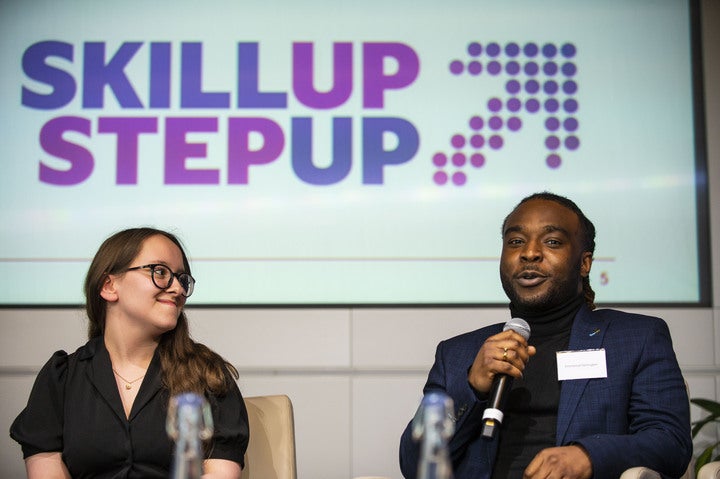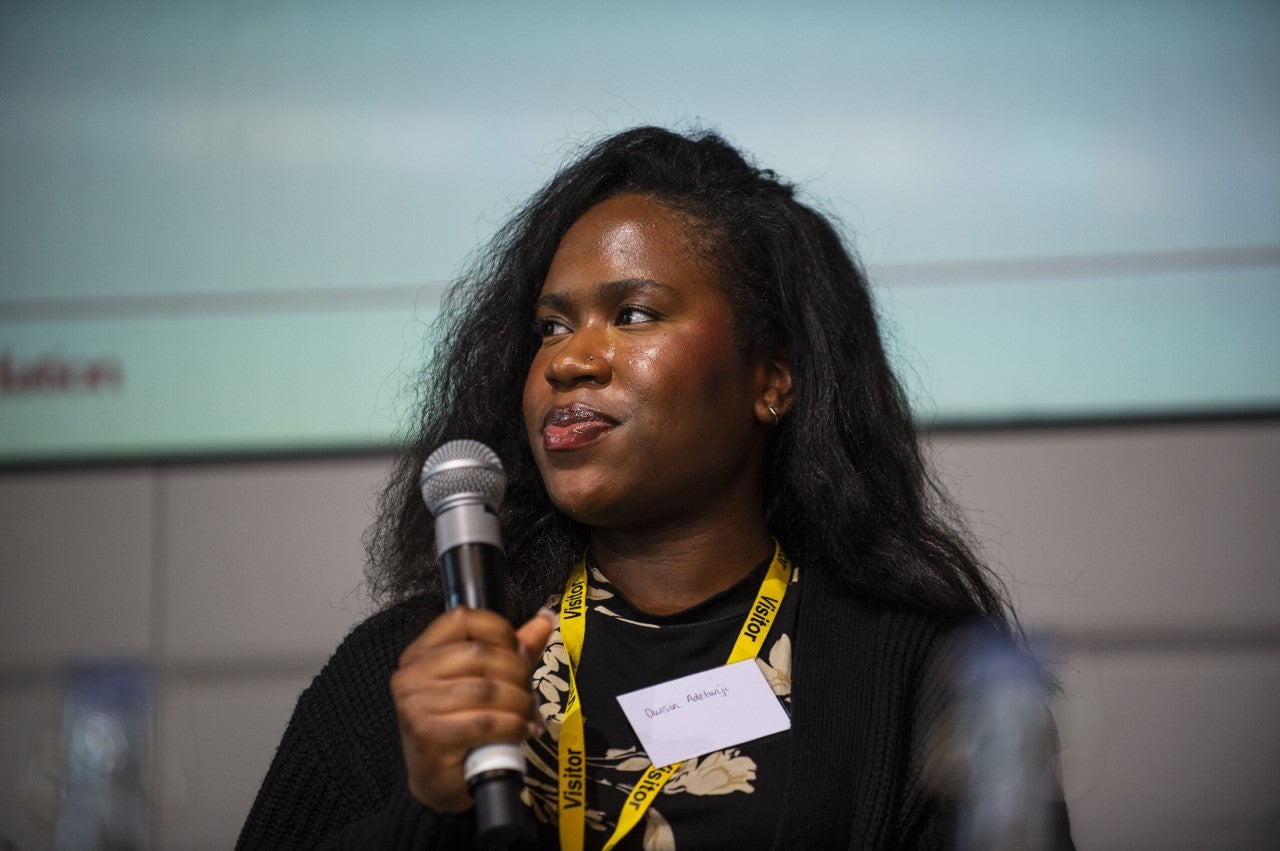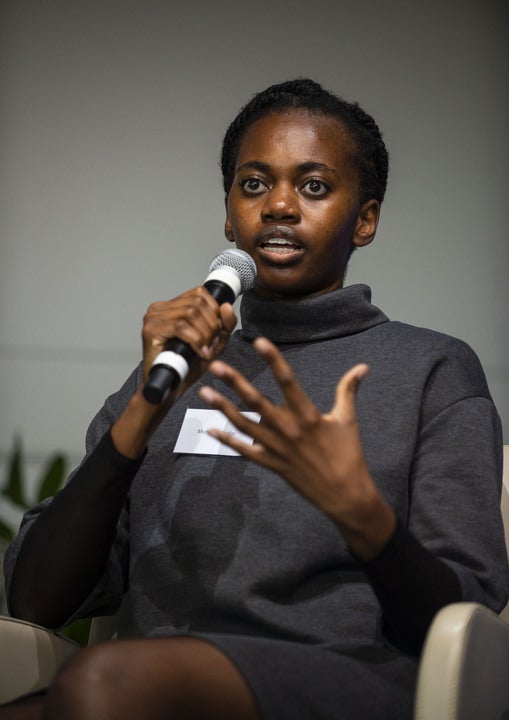
More than 400 jobless young Londoners have been trained and over 200 of them have secured jobs or apprenticeships thanks to our Skill Up Step Up campaign, it was announced at a networking event in London this week.
In a panel discussion at the Canary Wharf headquarters of Barclays, who backed our two-year initiative with a £1m donation, formerly unemployed youths told a 100-strong audience how their lives had been transformed after getting new skills thanks to our campaign. “I know now that I am enough,” said one. “I feel there is no ceiling on what I can do,” said another. “I used to feel despair but now I have hope,” added a third.
Our scheme, launched 15 months ago in partnership with the Evening Standard and the Barclays LifeSkills programme, addressed the conundrum of 20 per cent youth unemployment in London in the wake of the pandemic at a time of record job vacancies of 1.2 million countrywide – and it did so by tackling the skills gap and upgrading the competencies of the jobless.
Duro Oye, chief executive of 2020 Change, who along with City Gateway, Springboard, Resurgo and First Rung have been funded to provide empowerment training to disadvantaged youth as well as introductions to employers, chaired the panel discussion. He said: “Many youths who come to us have finished school and gone to university, but they don’t know how to navigate the corporate space. Our job is to equip them with the skills and network to complete the last mile. It is also about changing their mindset to believe they can succeed in white collar jobs.”
Jess Jones, community employability lead at Nando’s, one of over 100 employers who have supported our campaign, said the high quality of candidates had been borne out by “the great labour retention levels” of those they had hired.
Kate Markey, chief executive of The London Community Foundation who managed the initiative, said the “extreme inequality between haves and have nots” in the capital “compelled us to act”. She appealed to employers to “step up and give an opportunity to an upskilled young person”.
Below, three young participants in the panel discussion talk about the barriers they have faced and the game-changing journey they have been on.
‘I did not see dreadlocked Black youth like me employed in the corporate world’
Emmanuel Darlington, 28
Emmanuel had done all the right things since coming to London as a six-year-old from Nigeria, studying hard and getting a 2.1 in his business management degree from Wolverhampton University, but one seemingly insurmountable obstacle prevented him from getting started in his career. He could not see himself employed in a corporate setting. “I never knew people who looked like me in the corporate world,” he said. “As a Black guy with dreadlocks who grew up in Brixton, I felt they would never accept me, so I didn’t even try.”

The arrival of his son 15 months ago was a key moment. Until then, Emmanuel had dabbled in business, buying and reselling high-end trainers, but his income was volatile, varying between £3,000 a month and nothing. He needed a steady salary and turned to the youth empowerment organisation, 2020 Change, that had just helped his younger sister get a job with LexisNexis. “I saw huge change in my sister,” he said. “She had dropped out of uni and was lost but they got her on her feet and I thought, maybe they can sort me.”
Emmanuel signed up to their 10-week “I Am Change Programme” last year. “My expectations had been to get rich quick and buy my own yacht but I began to realise none of it was real. They got me to plan and strategise, but the biggest shift was in my head. Duro, who heads up the programme, is Black like me and he encouraged me to see myself as having a future in the corporate world. I interviewed for a consultancy job at Staffing 360, a company specialising in recruitment that I met through a 2020 job fair. I got in and now earn a healthy salary. My niche is pushing diversity and inclusion in recruitment. I love it and feel confident and happy – and yeah, like I can be a good provider for my son.”
‘I worried I would face unconscious bias at work’
Dunsin Adetunji, 18
When Dunsin looks out from her desk on the sixth floor at Man Group hedge fund overlooking London Bridge, she sometimes pinches herself to check “this is real”. “The view is so breathtaking and I feel I am at the centre of London, but the best part is that I used to be timid and lacked confidence and now I have an apprenticeship at a company that was beyond my wildest dreams,” she said.
Dunsin had found herself in a cul de sac last year after attending the Fashion Retail Academy post-school and realising she did not want to go into the fashion world. She saw an advert for a programme at City Gateway, a charity that provides free training for disadvantaged young people in east London, and joined their fast-track course in August. “They taught me to present myself: not to swallow my words, to make eye contact, not to spin on my chair and to thoroughly research the company I was applying to. I also watched videos on the Barclays LifeSkills programme which help you prepare for job interviews.”

Six months ago, City Gateway alerted her to opportunities at Man Group and she secured an apprenticeship in their communications division where her steep learning curve began. “At first I would sit in comms meetings and never talk but now I have learned to share my ideas,” she said. “My parents told me the workplace can be unfair for Black people and I worried I would face unconscious bias, but it’s much more diverse than I thought. I am learning that to be professional means putting my emotions to one side to seek solutions for the greater good. It feels amazing to be challenging myself every day and realising - I can do this.”
‘I have learnt life does not have to be so difficult’
Michelle Jideofor, 22
Michelle had made more than 25 job applications without success and was feeling thoroughly demoralised when she came across the youth empowerment programme at 2020 Change last April and decided to give it a go. As a teenager, Michelle had come over from Botswana full of promise brandishing A’s in her A-levels, but she found remote learning over the pandemic at Bristol University exceptionally tough and lost interest in her civil engineering studies.

“My sister and I were the first in my family to ever go to university and so I finished my degree but I felt aimless and had no direction,” she said. “At 2020 Change we covered topics they had not taught us in school or university but are essential for life. We had lessons in leadership, mindfulness, storytelling and property investment. We had to project ourselves forward five years and stand up and speak to our cohort and that boosted my confidence. I shared that I was interested in management consultancy and next thing, 2020 Change had arranged for me to be one of three girls applying for a business analyst job at Warn & Co, a consultancy focusing on business transformation.”
Michelle added: “I attended a dinner at a business club where we rotated to different staff members. There was a second round of interviews and then I heard I got the job. I joined last June and have learned so much, including that life does not have to be so difficult when you get on the right track. With the training, support and network I have in my new job, I feel hope and believe I can go far.”







